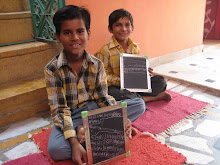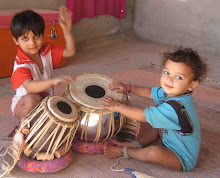Co-founder Sarwar Khan and I often found ourselves chatting about what the necessary ingredients are for educational success in the Merasi community, what pieces of ideology and slices of belief need to go into our little cooker for a triumphant Merasi to emerge. While we certainly never landed on a definitive, Julia Child-eat-your-heart-out recipe, in part because our definition of success is fluid and ever-evolving, we inched just a bit closer to a formula I think is worth sharing.
Education, we came to agree, is 50% intellect, which our school is just brimming with, and 50% believing, which is a bit harder to unearth in many students. Most kids walk in the front door with more than enough ability to succeed in our classrooms, or really any classroom, for that matter. But it's the belief, the confidence that they can and will own this knowledge that's a bit tougher to find or cultivate.
 Some of our students, like the Good (aspiring) Doctor Suriya Khan come into our lessons and classes with an innate confidence and we work to constructively build and grow that. Others, though, have a little less internal umph and one of our greatest academic challenges is to nourish and feed a sense of 'I can-itness' within our 41(!) students.
Some of our students, like the Good (aspiring) Doctor Suriya Khan come into our lessons and classes with an innate confidence and we work to constructively build and grow that. Others, though, have a little less internal umph and one of our greatest academic challenges is to nourish and feed a sense of 'I can-itness' within our 41(!) students.It's a tricky road to walk and one that we're just getting our footing on, but we're confident that our students' confidence and self-belief is within spitting distance. Now comes figuring out where, what and how great the distance is.
From all of us here at The Merasi School, have a merry, joyful and, of course, highly educational New Year!

